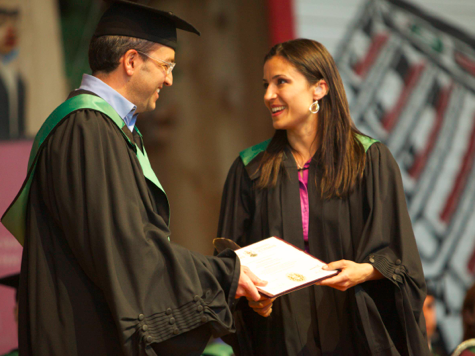EDMONTON – Dr. Jessica Dunkley has overcome incredible odds to become one of Canada’s first deaf doctors. It’s a career she first thought about when she was 10, but one that – back then – seemed unattainable.

“It was more of a dream, a fantasy, but not real…because the reality of working in health care as a person with hearing loss or being deaf – it’s hard. And there was no real role models out there.”
Born to deaf parents who hadn’t attended university, Dunkley didn’t even consider post secondary education as an option at first. As her interest in medicine grew, though, she decided to study physiotherapy. It was then that she learned about a special electronic stethoscope, one with a visual display.
And after meeting doctors in the U.S. who were deaf, Dunkley realized her childhood dream was now an actual possibility; she decided to apply to med school, and got accepted by the University of Ottawa.
Even though she had help from a sign language interpreter throughout the program, coming up with signs for all the new medical terminology she was learning required some creativity.
“With other deaf people, we don’t use medical terminology in our conversation, so it was something we had to come up with,” she says.
The hard work paid off. Dunkley graduated to become the first deaf Metis doctor in Canada.
“It was a nice honour, but I was just excited to graduate from med school, just like everyone else,” she says. “I was more happy I did it, and other people can as well. It’s not a barrier.
“Compared to 20, 30, 40 years ago – when I look at my parents, what opportunities they had, and what opportunities I have – I’m really fortunate. Even though, yes, there were challenges and barriers. But I think that’s part of change – you have to go through it to make change.”
Dunkley now hosts workshops about cancer screening, specifically for the deaf community. She plans to work in public health after her residency, which she is doing at the University of Alberta.
The school has made sure she gets the accommodation she needs, such as having an interpreter in loud, clinical settings or up to three in one day if she’s on call.
“I think the biggest issue for us is that it was a new thing for us. We hadn’t done it at the University of Alberta and the Faculty of Medicine. And AHS hadn’t had to work with a deaf resident before,” says Dr. Melanie Lewis, Associate Dean of Learner Affairs at the U of A’s Faculty of Medicine.
“When anything is new, medicine’s a pretty entrenched culture. New is difficult. So it was pushing past some barriers and looking at what was possible.”
But Lewis adds that Dunkley was accepted into the residency program for her abilities, which far outweigh her disability.
“And because, as medical educators, we recognize that individuals with extraordinary backgrounds make extraordinary physicians.
“There certainly haven’t been a lot of deaf physicians who can interact directly with the deaf community. So that’s an incredible opportunity for both patients, for the people around her so she can teach them, and for the community.”
Dunkley’s advice for others with hearing loss? Have a sense of resilience and stubbornness – it’s what she credits for getting her to where she is today.
“I always challenged myself when someone said there was something I couldn’t do. I would try to figure out a way to get over that,” she says.
“And I think that’s really important…to believe what you want, and not let other people change that.”
With files from Su-Ling Goh, Global News









Comments